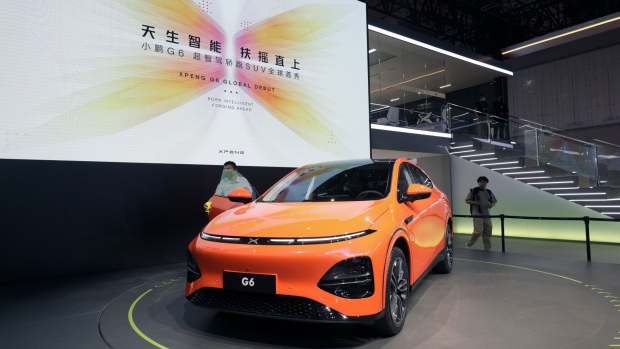Mar 19, 2024
Xpeng’s Net Loss Narrows as It Flags a Bumpy Outlook
, Bloomberg News

(Bloomberg) -- Xpeng Inc., the Chinese electric vehicle maker that’s partnered with Volkswagen AG, flagged a bumpy outlook even as it unveiled better-than-expected quarterly earnings.
Guangzhou-based Xpeng posted a net loss of 1.35 billion yuan ($188 million) for the three months ended Dec. 31, according to a filing Tuesday, versus expectations for a 2.97 billion yuan deficit and a 2.36 billion yuan shortfall the same period a year earlier.
That brought Xpeng’s losses for the full calendar year to 10.38 billion yuan, reflecting mounting woes in China’s competitive EV landscape. Analysts were expecting a loss of 11.3 billion yuan for 2023.
By delivering a record number of vehicles in the final three months of the year, Xpeng’s quarterly revenue surged to 13.1 billion yuan, a 154% increase from the same period a year ago. For the whole year, however, Xpeng only delivered 141,601 EVs, way behind its original sales goal.
“Looking beyond short-term challenges, Xpeng is about to embark on a major product cycle,” Chief Executive Officer He Xiaopeng said in the statement, adding it plans to launch more than 10 brand new models over the next three years and expand into more international markets.
Founded in 2014, Xpeng has been trying to compete head-to-head with Tesla Inc. with regard to product lineup and pricing. While appealing to tech-savvy, middle class, first-time EV buyers, Xpeng has found itself challenged by the US automaker’s fluctuating pricing strategy. It’s also now up against larger home-grown rival BYD Co., which has been expanding its lineup.
While Xpeng’s gross margin turned positive in the fourth quarter in part due to lower costs for lithium-ion batteries, its annual gross margin remained as low as 1.5%, a sharp decrease from the year before at 11.5%. Xpeng began an aggressive organizational restructuring and cost reduction plan in 2023 that’s ongoing.
The automaker now expects to deliver at most 22,500 cars in the first quarter of 2024 and revenue of as much as 6.2 billion yuan. That missed the market expectations of 11.7 billion yuan.
Xpeng signed a long-term strategic partnership with Volkswagen in July last year, aiming to leverage synergies in sourcing, manufacturing capabilities and technological expertise. The deal also saw Xpeng issue around 5% of its outstanding share capital to VW for about $700 million. Revenues generated from platform and technology sharing will start to contribute to the company’s gross margin this year, said He in an earnings call Tuesday.
Xpeng also unveiled plans to launch a new sub-brand targeting the more affordable EV segment, with a car priced between 100,000 yuan and 150,000 yuan, dubbed MONA, signaling its commitment to diversifying its product portfolio and capturing a broader customer base.
The plan, unveiled during a forum in Beijing earlier this month, followed an announcement about launching mass market models with Didi Global Inc. catering to both individual customers and fleet operators. Delivery will start as soon as in the third quarter, while the company is working to debut a new model under the main brand, He said.
The company will also expedite its overseas expansion into more markets in Western Europe, Middle East, Southeastern Asia and Commonwealth of Nations, the company executives said, expecting to deliver tens of thousands of vehicles from outside China. In the home market, Xpeng has cut off 130 under-performing dealer stores and will start deploying new sales points in especially lower-tier cities from the second quarter.
Read more: Xiaomi Unveils EV in Bid to Become China’s Porsche or Tesla
Xpeng is also making a bigger bet on advanced assisted driving systems, which is also being pushed by its rivals in China.
However, the strategy will come up against stiff competition from Chinese smartphone makers like Huawei Technologies Co. and Xiaomi Corp., both now in the electric car game themselves.
Read more: Huawei’s EV Is China’s No. 1 Among Upstarts for Second Month
Shares in Xpeng are down 33% this year after rising 47% in 2023 when EV demand globally looked to be on a much stronger footing.
(Updates with details from conference call)
©2024 Bloomberg L.P.





